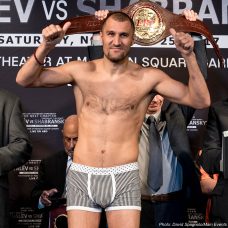Krusher’s mean regression to the mean
By Bart Barry-

Saturday or Sunday on ESPN+ Russian Sergey “Krusher” Kovalev decisioned Colombian Eleider “Storm” Alvarez in Texas to reclaim one of the titles Kovalev won, in part, by losing so spectacularly to Andre Ward in 2017 that Ward decided to retire on the highest note of his career. In avenging his latest knockout loss, Kovalev boxed well, Saturday, and Alvarez did not, and that was that.
Kovalev is and will be remembered as a b-level prizefighter cleverly presented as much more by a b-level network, in mid-descent from a-level, a symptom more than a cause, a titlist folded in half by the only a-level prizefighter he faced – average ingredients well-prepared during a famine. Much of what happened Saturday, much of what you’ll read and hear for the rest of Kovalev’s career, is and will be about preserving illusive credibility despite concessions to illusions past.
“Others are wrong!” in other words, not “I was right.” Overtraining this or distractions that. Paeans to Kovalev’s age aside, what aficionados saw in Kovalev-Alvarez 2 was the same guy they saw tentatively box to victory against Bernard Hopkins, a once a-level prizefighter 50 or so days from his 50th birthday.
Now that we have the hindsight of the same B-Hop being knocked outframe, outboxing, outring by Joe Smith 13 months after Kovalev’s careful showing we might reexamine our insightfulness before we reappraise Kovalev. Could he punch? Sure he could. Was he a frontrunner? Sure he was. Could he finish? Yup. Was he great? No, never.
There’s selfservice in Andre Ward’s ongoing postrematch analyses of Kovalev, even while there needn’t be, an opening desire to reassert Ward’s superiority followed by a closing desire to burnish Ward’s legacy a smidgen more at halfprice. What remains constant as gravity, though, is a fact like: Were Ward and Kovalev matched at Ward’s best weight, not Kovalev’s, Ward would’ve gone 10-0 (10 KOs) in both this lifetime and the next.
Saturday’s question, finally, isn’t whether Kovalev underwent some historic revision in one training camp with Buddy McGirt (he didn’t) or whether Eleider Alvarez underwent some historic dissipation in the last halfyear, but why we actually care. Some of it, though much less than years past, is standard Stockholm-syndrome stuff. The January boxing calendar is historically anemic, leading young fans and pundits to get unseemly giddy at anything better than an obviously mediocre happening before March.
Most of it, though, is vestigial HBO hype. Like the network’s defunct commentary trio scoring midrounds according to prefight prejudice, quite a few of us did not notice HBO’s shift from singular authority to underbudgeted shell, when it happened, because it was incremental.
The emerging consensus is that HBO Sports’ last great boxing authority was Lou DiBella, who left the network in 2000. That feels about right. The talents and promotional relationships DiBella built and featured carried the network a little less than a decade before the network’s dearth of knowledgeable programmers began showing its ribs. The departure of a talented producer though talentless programmer in 2010 began the qualitative freefall that followed. Wealthy and knowledgeable became wealthy and gullible became middleclass and gullible became poor and gullible became canceled.
Nearabout HBO’s middleclass and gullible stage arrived a surfeit of prizefighters raised in the Soviet Union to prey, at once, on the juvenile nightmares and adulthood nostalgia of fiftysomething viewers. It took little in the way of imaginative squinting, then, for HBO Sports’ target demographic to see in Kovalev, and his fellow Eurasian bogeyman, Gennady Golovkin, far more than what they actually were (later confirmed, of course, when both were beaten by smaller men from North America, “controversially”). A reflexive reality still happened in viewers’ minds and that reality affected commentators’ perceptions even as they sought to affect viewers’ perceptions.
One monument to this, probably the greatest, was Kovalev-Hopkins in 2014. Kovalev dropped Hopkins in their first round together and then did not imperil him again in the 11 that followed. A fearsome 31-year-old puncher, in other words, was unable to snatch consciousness from his dad in 36 minutes of trying. Absurd as that sentence reads today we all obeyed a tacit moratorium on calling it what it was – desperate as we were to keep the juggling balls in the air, to contend our oncegreat sport broadcasted on a oncegreat network was something more than risible goofy. Surrealer still was the twoyear, fourfight Kovalev victory pageant HBO hosted in the great man’s honor after Kovalev decisioned a man 10 years nearer Social Security eligibility than his physical prime.
This really happened. You may even be old enough to remember it.
It took super middleweight Andre Ward 20 rounds to do it, but this too happened surely enough: Kovalev, eyes averted, belly up, offered himself to Ward with thighs splayed – the better to be sniffed – in an act of animal submission more ably narrated by David Attenborough than Jim Lampley.
And still HBO persisted! This time with silly opponents and sillier narratives right up until Kovalev got himself whupped by a shortnotice Colombian making a world-title-match debut after his 33rd birthday. Yet another coursecorrection ensued and Eleider Alvarez, a man who’d knocked-out a perfectly symmetrical if entirely unimpressive 12 of 24 opponents, became some Andean beast whose fists Kovalev would need God’s own luck to survive.
OK, fair point: This last was ESPN’s manufacture, not HBO’s. Alvarez regressed to his mean; the Krusher character begins its next rewrite. Fortunately Kovalev’s latest comeback has found its proper platform, off premium cable and on a $5/month boxing-after-midnight app.
Bart Barry can be reached via Twitter @bartbarry